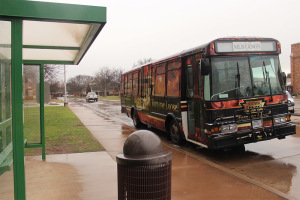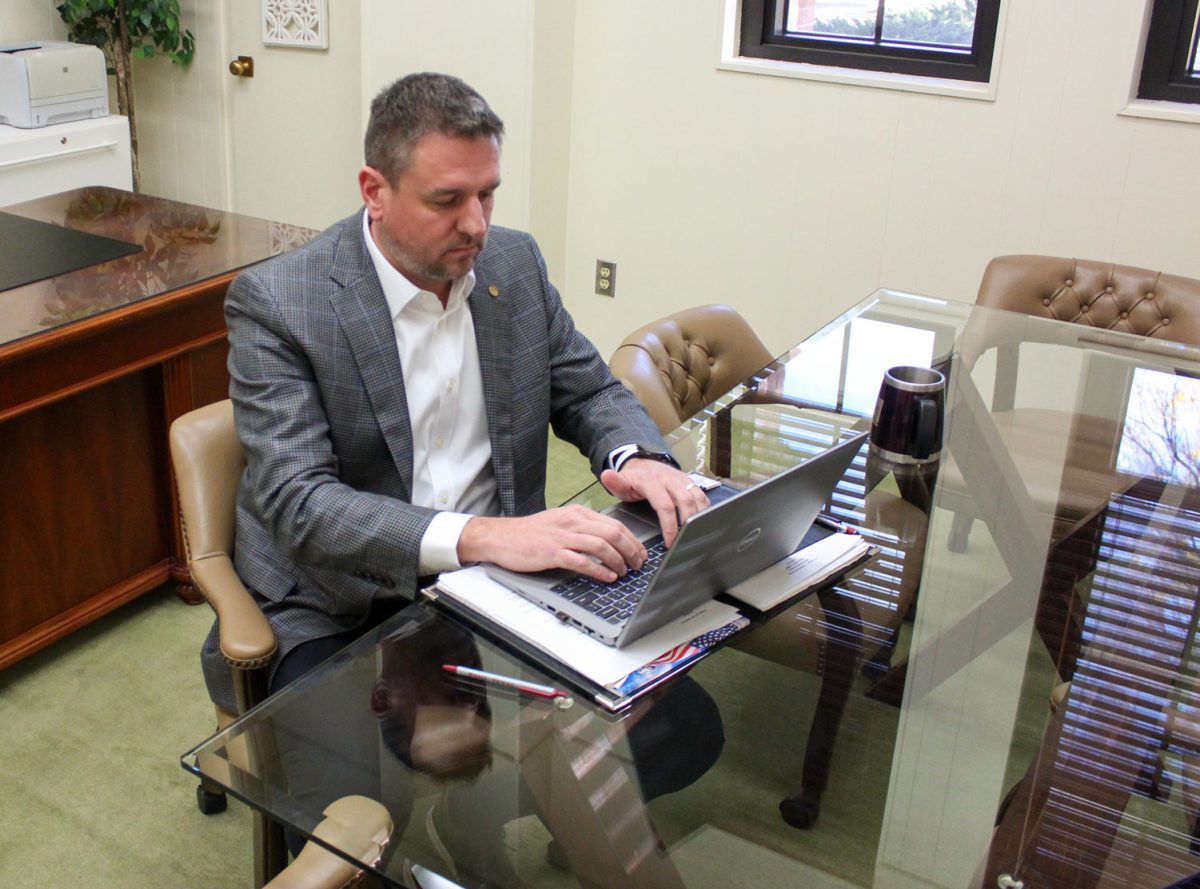
With campus growth and major construction to accommodate the rising residential population on the horizon, public transit increasingly seems to be a solution for students without vehicles. A bill to expand bus services to weekends and additional routes was proposed at last night’s Student Government Association meeting.
The university has long since partnered with the city of Wichita Falls to provide students a means of transportation to and from campus. The existing shuttle route also allows those equipped with MSU identification cards to freely switch to the Falls Ride connector, which stops at Wal-Mart and other necessary venues.
Even so, students have expressed dissatisfaction with the system. While the Mustangs shuttle runs its full circle roughly every 15 minutes between 7 a.m. and 10 p.m., its service is limited to business days, leaving the weekends—when most are looking to travel off campus—untouched. Likewise, the connector runs on one-hour intervals from 5:30 a.m. to 7:30 p.m. on weekdays and from 10:30 a.m. to 5:30 p.m. on Saturday. For commuter students without personal vehicles like Uri Easter, computer science senior, this can be a problem.
“Basically, if you want to get anything done, you have to be done before 6 p.m.,” Easter said. “All your time is restricted, and being a student, you need to have a flexible schedule. The bus doesn’t always allow for that.”
Missing the connector is even worse. Though Easter lives at home, his friends and family are not always able to help him when he’s stuck at a bus stop. He occasionally calls for a cab. For him, a ride typically costs $8, or a full hour’s pay.
“On Saturdays, sometimes I want to come onto campus to study, [but] the bus stops at 4 p.m. Luckily I have had friends who can sometimes take me home, but if not, it’s a taxi,” Easter said.
As a shuttle user herself, freshman student senator and nursing major Jaylon Williams knows of Easter’s dilemma all too well. She observed that students using the bus system must also buy groceries before the weekend, often between classes, prompting her to want to make a change.
“We don’t want people to think it’s just about wanting to go to more stores or the movies,” she said. “People have jobs, and the bus is their main means to get to work. If they have a weekend shift, are they going to walk or call a taxi service? That’s not fair to them.”
With the help of other SGA senators and faculty, Williams has written a bill that includes three main parts: offering service to those who live beyond Colony Park, an increased route that visits more entertainment and businesses establishments, and the addition of a Saturday route. These changes would cause the bus to run every thirty minutes as opposed to fifteen. Within two days, Williams was able to obtain 180 signatures from students in support of the expanded route, and to further substantiate her cause, an official meeting with Matthew Park, dean of students, was held Feb. 12.
“As we look at larger entering classes and think about a new second-year residence hall, it’d be great to provide a service to students who don’t necessarily have transportation,” Park said. “We also have a slightly increasing international student population living off campus, as well as commuter students in various apartment communities. Providing this as a service to those students, should they take advantage of it, is a positive endeavor.”
After meeting with city officials and Keith Lamb, vice president of student affairs and enrollment management, Park believes that a new “weekend piece” will be added to include transportation to shopping and entertainment venues along with the standard stops on late Friday and Saturday afternoons every other week, perhaps extending into the evening.
“It’s possible that this is something that we can pilot at the end of the spring semester, maybe sometime in April, just to see how students respond to it,” Park said. “That was the main focus of our meeting, as well as planning for the 2015-16 year, when the new housing project construction begins and displaces the 220-space parking lot.”
According to Park, there are more changes to be expected. In response to requests, the city is willing to install a covered shelter at the Fain Fine Arts stop that serves the Southwest quadrant of campus, and, as a bonus, the service of two new short buses will be given to MSU.
Lamb is also on board with the expected revisions, stating that the current bus system is “very ineffective.”
“I think student-led initiatives are great and there’s an educational component. I’m glad to see the students voicing what they want,” Lamb said.
Neither Lamb or Park said they foresaw the changes impacting student fees.
“If students take advantage of an enhanced service, the cost to the university itself will be minimal,” Park said. “Students should know that the likelihood of our implementing this for the following academic year somewhat hinges on to what extent it is taken advantage of. Participation drives the success and drives the funding.”
A student vote will be taken on the bill at the March 3 SGA meeting.












